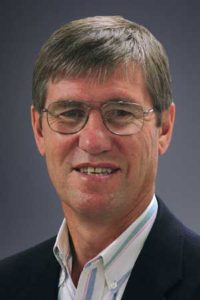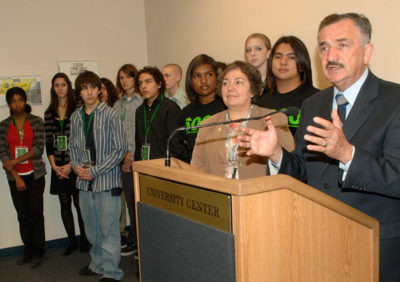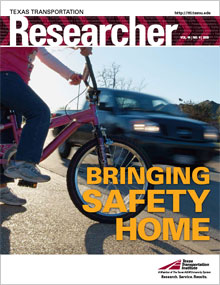Briaud seeks top job of international society

Next year, TTI Research Engineer Jean-Louis Briaud will learn if he will become president of the International Society for Soil Mechanics and Geotechnical Engineering (ISSMGE). Briaud, a Texas A&M University Zachry Department of Civil Engineering professor and holder of the Spencer J. Buchanan Chair in Civil Engineering, has become renowned worldwide for his work in soil mechanics and foundation engineering.
ISSMGE is an 84-member society representing
18,000 individual members. It works to promote cooperation among engineers and scientists for advancement in the field of geotechnics as well as its engineering and environmental applications. The elections will take place Oct. 4, 2009, in Alexandria, Egypt.
“It is exciting to have a chance to serve all my colleagues on the international scene, to get an appreciation of the geotechnical practice and culture in different countries and to further develop communication between countries,” Briaud says. “If there are any Aggies out there with good ties to the geotechnical leaders of the member countries, I sure could use some help.”
Professor Briaud developed a website (https://ceprofs.tamu.edu/briaud/) that details his experience and presents his vision for ISSMGE.
TTI center to study increased waterway travel
TTI’s Center for Ports and Waterways (CPW) has been selected as the contractor for a $100,000 National Cooperative Freight Research Program (NCFRP) contract that will determine the feasibility of increasing freight traffic on our nation’s waterways.
“The North American marine highway system is underutilized at a time when the nation’s roads and freight systems are at near-maximum levels,” says CPW Director Jim Kruse. “Increasing waterway freight transport is essential, considering that freight traffic will need to double in the next 25 years to accommodate our growing population. By shifting our emphasis to short sea shipping, it will help in numerous areas, from congestion to pollution.”
The research project will evaluate the obstacles for increasing short sea shipping. In part, Kruse and his staff will produce a white paper that proposes strategies to overcome those current barriers.
CPW released a report this year for the National Waterways Foundation and the U.S. Maritime Administration highlighting the benefits of moving cargo by water. For example, barges move a ton of cargo 576 miles for each gallon of fuel expended. That’s a much better average than railroads (413 miles) and trucks (155 miles).
Shunk remembered for professionalism, caring
The former manager of the Urban Analysis Program at the Texas Transportation Institute, Gordon A. Shunk, died Nov. 5, 2008, after a lengthy struggle with frontal temporal lobe dementia.
Shunk’s career in transportation forecasting and modeling spanned 35 years after he received his Ph.D. from Purdue University. His work included duties with the Metropolitan Transportation Commission in Berkeley, California, the North Central Texas Council of Governments (where he was director of transportation) and 13 years with TTI before retiring in 2003.
“Gordon was known for his professionalism and his ability to communicate on a very human level despite his precise, technical work,” says TTI’s Montie Wade, a colleague of Shunk. “Even during the time of his illness, he expressed concern about his co-workers and their well-being.”
An honorarium on Shunk’s behalf was held Jan. 12 at the Transportation Research Board Annual Meeting in Washington, D.C., highlighting his engineering work.
Visiting scholar brings China to TTI

From her home in Beijing, China, Jianping Sun travels the 8.5 kilometers to her office every day to the Beijing Transportation Research Center (BTRC) where she’s worked as a mobility expert for four years. She’s one of about 50 employees at the center, which was established in 2001. Her 5-mile commute takes nearly an hour each way. “The mobility in College Station is much better,” she laughs.
In her first trip to the United States, Sun arrived at TTI on Sept. 6, as a visiting scholar working in the Mobility Analysis Program, alongside Shawn Turner and Teresa Qu. According to Turner, Sun is one of the first visiting scholars at TTI, “but because of our international efforts, I think we need to do this more often. These one-on-one personal interactions do a lot to foster our relationships with experts in other countries.”
Agreeing, Sun says, “At BTRC, we all know of TTI. Actually being here is impressive because you have so many employees and so many fields of study.”
TTI first worked with BTRC in 2006 on a congestion evaluation project, but the collaboration on several topics has continued since then. Sun hopes to work with the Institute again. “In the future, I think BTRC will be better known because of our work with TTI.” She finished her work in College Station and traveled home to Beijing at the end of November.
TDS Summit showcases teen driver safety

In the first Teens in the Driver Seat (TDS) Summit, the peer-to-peer education and outreach program included 48 different schools from 35 cities. With 200 attendees, the Oct. 24-25 summit in San Antonio highlighted students and their accomplishments in presentations, breakout sessions and video interviews.
“I think the summit hit a home run,” TDS Director Russell Henk said afterward. “Many of the teenagers said they were grateful that the event and the TDS program gave them a voice on this issue…something they say they are not used to, but are excited about and very much welcome.”
TDS is a TTI-developed program that pinpoints the causes of most teen car crashes. The in-school program has grown across Texas and is now beginning in Georgia and Connecticut, with two other states considering the program for their schools.
Prior to the event, U.S. Representative Ciro Rodriguez held a press conference to announce a 27 percent decline in fatal accidents involving teen drivers in Texas from 2002 to 2006, a decline that is more than twice the pace of the national average. “Effective laws and parental involvement are essential,” said Rodriguez. “But laws and parents will never be enough. We need teenagers to drive the message—just as they’re doing through Teens in the Driver Seat.”
Rodriguez and Maria Teresa Cerqueira of the World Health Organization, both strong supporters of TDS, were among the speakers at the summit, which was held at The University of Texas at San Antonio.
The summit’s breakout sessions included both adult and teenager “tracks,” all specifically geared to them. HEB grocery stores and Fiesta Texas sponsored door prizes, which included iPods and tickets to the Fiesta Texas theme park.
The second annual TDS Summit will be held next year in El Paso.
Ike changes lives of TTI Houston, Galveston employees

When Hurricane Ike was approaching the Texas coast Sept. 11, staff members in the TTI Houston and Galveston Offices were preparing to secure their facilities and head home to protect life and property. But for some of the 25 Institute employees at 701 N. Post Oak, it meant that work was just beginning.
In advance of the storm, Darrell Borchardt and Jonathan Tydlacka led the deployment of traffic count equipment at almost 50 locations across the Houston region to provide traffic data along hurricane evacuation routes. To support Texas Department of Transportation (TxDOT) staff at Houston TranStar, Borchardt, Tony Voigt and Mike Vickich monitored the regional traffic sensor network as evacuations commenced.
After the storm, Vickich and Kathy Tran managed critical updates of public information to the TranStar website. At the request of TxDOT and the Harris County Office of Emergency Management, Tydlacka and the Houston Office field crew staff—including Paul Adamson and Michael Davis—transported and set up TTI’s data collection trailer at Houston’s Reliant Park so that emergency management personnel could remotely monitor the flow of Federal Emergency Management Agency (FEMA) supply trucks in and out of the city.
“While many of us in the Houston Office were busy boarding up our homes and preparing our families for the worst, we were also doing the best we could to continue to help our sponsors collect and disseminate traffic and emergency management information to decision makers and the public,” says Voigt, program manager for the Houston Research and Implementation Office. “Ike impacted all of us in the Houston Office in various ways. Most of us sustained damage to our homes and were without electricity for a week or so.”
The basement and elevators of TTI’s Houston Office building received water damage from the storm but were repaired so that employees could return to work by Sept. 22. The TTI office on the Texas A&M campus on Pelican Island reopened Thanksgiving. Two employees live in Galveston and have offices on campus. Ryan Taylor temporarily relocated to the Arlington Office. Linda Cherrington worked out of her home.
“I was one of the very fortunate,” Cherrington says. “My home was not damaged, electricity came back quickly, and I have Internet access. So, I’m working as most residents here are cleaning up and trying to get their lives back to normal.”
Ike also had an impact on numerous employees living in the Navasota, Somerville and Caldwell areas due to electrical outages.
For more about TTI’s involvement in preparing for Hurricane Ike, see “Houston versus the hurricane” in this issue.
